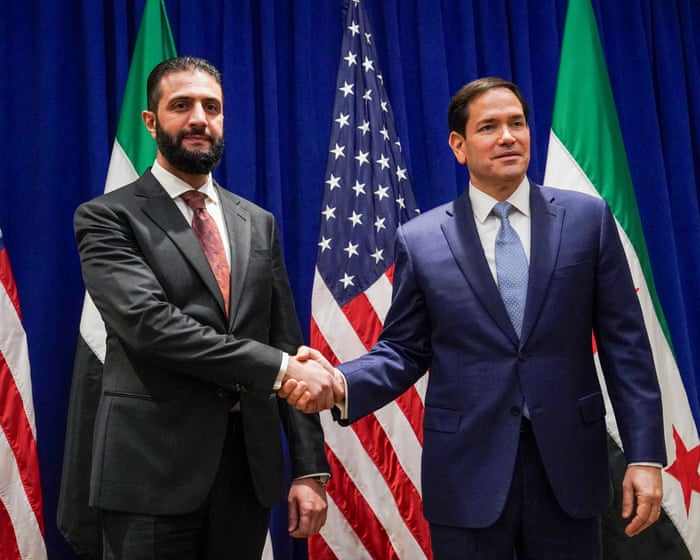Not long ago, Ahmed al-Sharaa—better known by his alias Abu Mohammed al-Jolani—would have been arrested upon arriving in the United States. As the former leader of Syria’s al-Nusra Front, he had a $10 million bounty on his head for organizing numerous terrorist attacks across Syria, many of which targeted civilians.
But this week, after toppling dictator Bashar al-Assad in a swift offensive last December, he is being celebrated in New York. He is meeting with world leaders at the United Nations General Assembly—the first Syrian head of state to do so since 1967.
“For many years, we endured injustice, deprivation, and oppression,” Sharaa said in his address, dressed in a tailored gray suit and burgundy tie. “Then we rose up to claim our dignity.”
He faces a difficult challenge at this week’s UN gathering: to present himself as a statesman who can ease concerns about his past, calm fears of sectarian violence, and handle delicate diplomacy with the United States and Israel—all while preserving the hardline reputation that brought him to power back home.
The former militant’s arrival has created surreal scenes in New York. On Tuesday evening, one of the city’s most sought-after invitations was to an exclusive private club in midtown Manhattan, where Sharaa spoke about his journey from jihadist to statesman in a “fireside chat” hosted by the Middle East Institute.
He has a rehearsed response to skepticism about his transformation: critics should not judge his past—including his time with al-Qaida—without considering the context he lived in. “Anyone who sees a child killed in the streets will revolt,” he said through a live Arabic translation. “The pressure pushed people to seek solutions using whatever means they had.”
A day earlier, he met with David Petraeus, the former CIA director and U.S. general who led multinational forces in Iraq while Sharaa was fighting—and later imprisoned—there with other al-Qaida members.
“It’s good that we were once in combat, and now we are in dialogue,” Sharaa said, smiling at his former adversary. “Someone who has experienced war understands best the importance of peace.”
Privately, Trump administration officials acknowledge that the U.S. has no alternative to Sharaa’s leadership in Syria. They see him as the best hope for preventing a return to civil war. While urging him to moderate his statements about Israel and curb sectarian violence at home, they also worry about alienating him from his base and local allies.
“He is jumping through hoops to show he can be a world leader, not just a fighter,” said one U.S. official who has met with Sharaa. “Everything is very carefully calculated… So far, he’s pulling it off.”
At one point, Petraeus turned almost tenderly to the former head of Hay’at Tahrir al-Sham—which was only removed from the U.S. terrorist list in July—and asked a more personal question: “How are you holding up under all this pressure? Are you getting time to think? Are you sleeping enough at night? I’ve been there, and it’s very, very hard. Your many fans—and I am one—we worry about you.” The room at the Concordia Center broke into applause.
In public, Sharaa has said there is a chance for peace with Israel, but he also expressed that Syria is “afraid” of Israel’s foreign policy in the region. He rejected the idea of Syria joining the Abraham Accords to normalize relations, citing public anger over Israeli airstrikes in Syria and the war in Gaza.
Another key goal for Sharaa during his visit to New York is to…This week in New York, Syria’s foreign minister is urging the United States to lift sanctions on his country. Although Donald Trump ended some sanctions in June, the Caesar Syria Civilian Protection Act of 2019 would need to be repealed by Congress—a step that may not happen soon.
Before a meeting with Marco Rubio, the minister, Sharaa, was asked about removing the sanctions. He shrugged and gestured toward the U.S. secretary of state, as if to say, “It’s not my decision—it’s his.”
“The Syrian people should not suffer again because of sanctions,” Sharaa said this week. “The Syrian people want to work. Lift the sanctions, and don’t worry about them.”
Frequently Asked Questions



